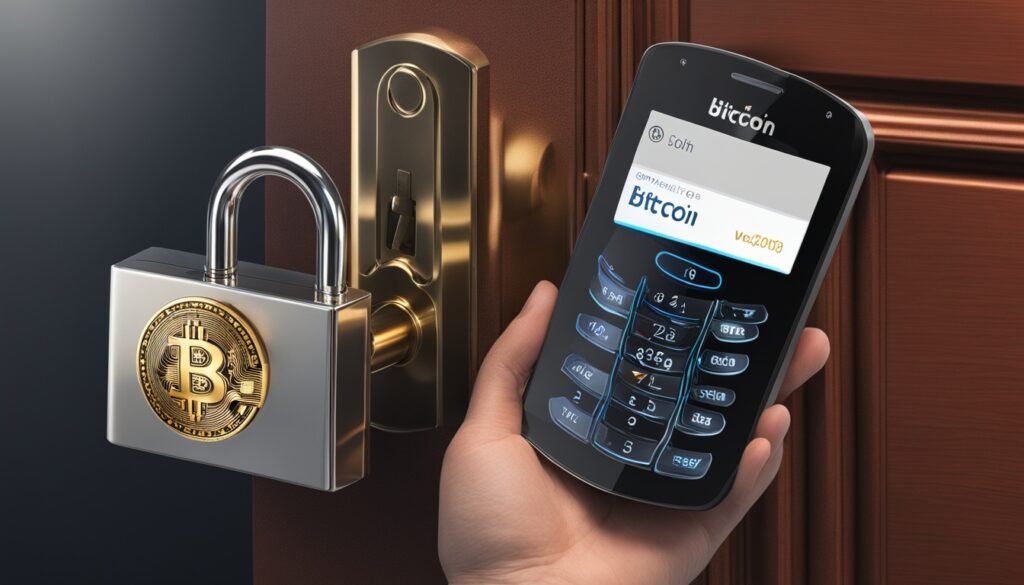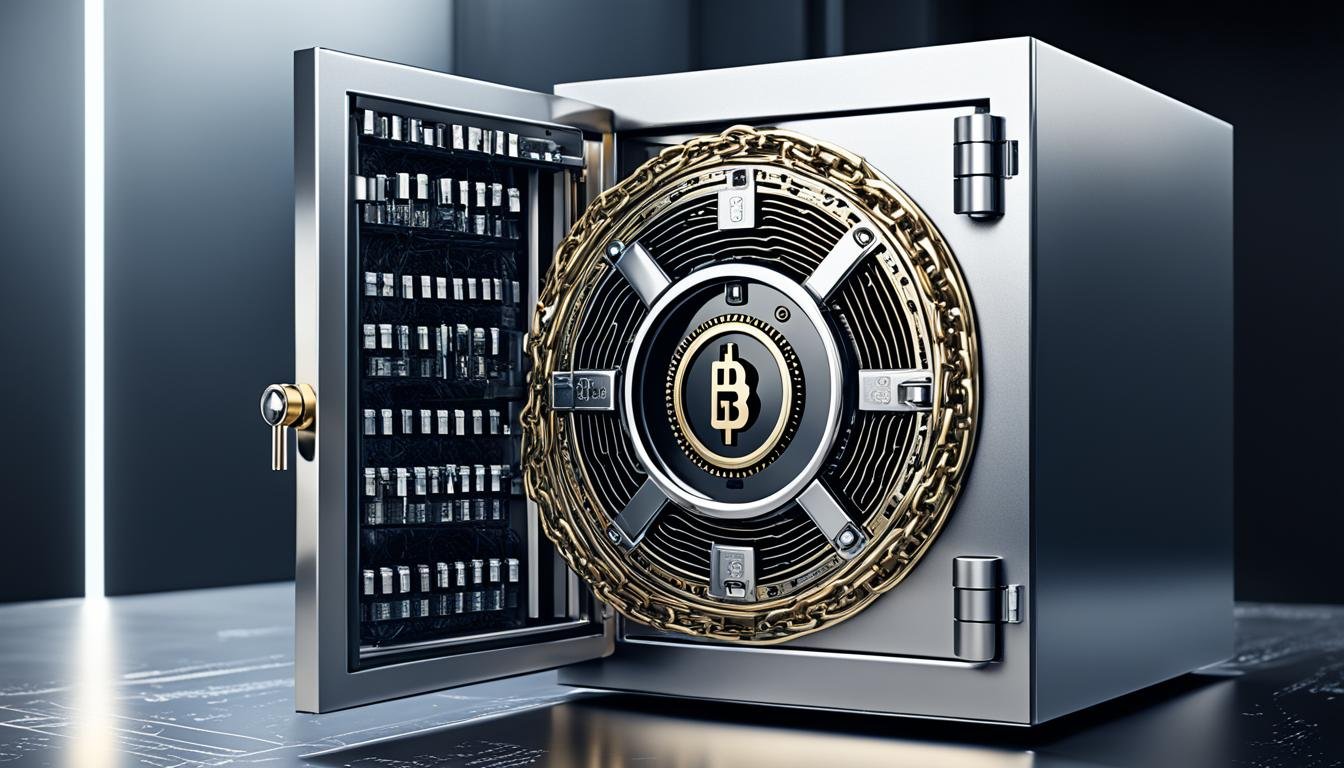Bitcoin lets you send value worldwide and control your funds. It’s like a physical wallet but for digital money. Keeping a lot of Bitcoin on computers or phones isn’t safe for everyday use.
It’s key to back up your wallet to protect against technical issues and mistakes. Encryption is vital for online backups. Using different backup methods, like USB keys and paper, lowers the risk of losing everything.
Keeping your wallet backed up and encrypted with strong passwords is smart. For savings, consider an offline wallet for the best security. These wallets stay off the network, making them very secure.
Hardware wallets are a safe and easy-to-use choice. They’re made to be safe from computer threats and theft. Keeping your Bitcoin software updated and using multi-signature features helps protect your money. Thinking about who will have access to your Bitcoin after you’re gone is also important for security.
Key Takeaways
- Only keep small amounts of bitcoins on mobile, computer, or server for everyday use.
- Using a cold storage solution or offline wallet provides the highest level of security.
- Encrypting online backups is crucial to prevent unauthorized access.
- Implementing a strong password and two-factor authentication enhances wallet security.
- Regular updates on Bitcoin software ensure stability and additional security.
- Hardware wallets like Ledger and Trezor offer robust security, preventing online threats.
- Developing a comprehensive backup plan is essential for unforeseen events.
Mastering Two-Factor Authentication for Bitcoin Security: Best Practices
Two-factor authentication (2FA) is key to keeping Bitcoin wallets safe. It adds an extra layer of protection by asking for a password, username, and another unique verification. This makes sure your Bitcoin transactions are secure.

Phishing attacks are a big threat, especially when dealing with secure transactions. Using two-factor authentication helps by making users prove who they are with SMS codes, apps, or tokens. Here’s a look at different 2FA methods to help you choose the best for your Bitcoin wallet:
| Method | Benefits | Challenges |
|---|---|---|
| SMS-based codes | Easy to use, accessible | At risk from SIM swapping |
| Authenticator apps (e.g., Google Authenticator) | More secure, works offline | Needs a device |
| Hardware tokens (e.g., YubiKey) | Most secure, needs physical access | Can be costly, easy to lose |
Adding two-factor authentication to your Bitcoin wallet is important. It’s not just about picking a method, but also about keeping up with security checks. Make sure to update your passwords often and use strong, unique combinations. Using strong 2FA methods and staying updated on Bitcoin security will help protect your digital money. Remember, once a Bitcoin transaction is done, it can’t be undone. So, it’s crucial to use strong security like two-factor authentication to keep your digital money safe.
Decoding Cold Storage vs. Hot Wallets for Bitcoin: Which is Safer?
Choosing between cold storage and hot wallets for cryptocurrency is a big decision. It depends on how important security and convenience are to you. Cold storage solutions are very secure because they are not connected to the internet. They include things like hardware wallets, paper wallets, and offline digital wallets.

Online bitcoin wallets, or hot wallets, are always connected to the internet. They are great for making lots of transactions. But, they are also at a higher risk of being hacked or attacked by malware.
Cold storage is best for keeping a lot of Bitcoin safe for a long time. Cold wallets make private keys offline, which means they are very secure. Hot wallets are better for people who need to use their cryptocurrency often, even if they are less secure.
In 2022, hackers stole $3.8 billion worth of cryptocurrency, mostly from online wallets. By 2023, this dropped to $1.7 billion, even though hackers tried harder. These numbers show that keeping your cryptocurrency online can be risky. Offline storage is much safer.
| Feature | Cold Storage | Hot Wallets |
|---|---|---|
| Security Level | High | Medium to Low |
| Internet Connectivity | Offline | Online |
| Convenience for Transactions | Low | High |
| Risk of Cyber Attacks | Low | High |
| Ideal Use Case | Long-term, high-value storage | Frequent, low-value transactions |
Choosing between cold storage for security or hot wallets for easy transactions depends on what you need. Think about why you have cryptocurrency, how often you use it, and how important security is to you. Knowing the differences between these options helps you protect your digital money better.
10 Best Practices for Securing Your Bitcoin Wallet: Expert Tips
Keeping your Bitcoin wallet safe is crucial for protecting your digital money. With more security breaches, it’s key to use strong security steps. Here are the top 10 ways to keep your secure bitcoin storage safe:
- Use Strong, Unique Passwords: Make sure your wallet encryption has strong, unique passwords. Don’t use common words or easy guesses.
- Employ Antivirus and Anti-Malware Software: Update your antivirus and anti-malware to fight off threats.
- Utilize Multi-Signature Wallets: Multi-signature wallets need more keys for a transaction. This adds more cryptocurrency security.
- Conduct Regular Backups: Back up your wallet often and keep copies in different places. This way, you can recover your money if you lose it.
- Use Cold Storage for Majority Funds: Keep most of your money in cold storage devices like Trezor and Ledger. Only use hot wallets for everyday spending.
- Stay Alert to Phishing Scams: Phishing scams can cause big losses. Always check email addresses and links before clicking to avoid scams.
- Operate on Trustworthy Networks: Use your wallet on secure networks and with VPNs for better secure storage for bitcoin.
- Choose Reputable Wallet Providers: Pick wallets from trusted providers known for their best bitcoin wallets and security.
- Monitor Your Wallet Regularly: Watch your wallet closely and set up alerts for unauthorized transactions.
- Verify SSL Security: Use web wallets with SSL certificates and check for HTTPS in the address bar for a secure connection.
There have been many reports of people losing money to phishing scams. Using hardware wallets is now a top choice for keeping your money safe. Following these best practices can greatly improve your cryptocurrency security. As more people use cryptocurrencies, keeping your digital money safe is more important than ever. These tips will help protect your digital assets from threats.
Crafting a Robust Password for Your Bitcoin Wallet: Step-by-Step Guide
Creating strong passwords is key to keeping your crypto safe and avoiding losses. Did you know that about 20% of all Bitcoins are lost because people forget their passwords or lose their private keys? So, making a secure bitcoin wallet begins with a complex and unique password.
When setting up your bitcoin wallet encryption, mix letters, numbers, and symbols. Try to make your password at least 16 characters long to fight off brute-force attacks. Stay away from common phrases or easy-to-guess info.
Using a password manager or tool can make making strong passwords easier and safer. Also, never use the same password on different sites or wallets. This is risky. Bitcoin doesn’t have a way to recover passwords like banks do, so don’t forget your password.
Here are some expert tips to keep your crypto safe:
- Use hardware wallets like the Cold Wallet from Material Bitcoin for cold storage.
- Avoid public Wi-Fi for transactions and use a VPN for encrypted connections if needed.
- Keep your wallet’s seed phrase in a safe place, like on paper.
- Update your wallet software regularly to protect against threats.
Adding two-factor authentication (2FA) is also a good idea. It requires a unique code sent to your phone or email. This adds an extra layer of security to your bitcoin wallet.
Along with a strong password, choosing the best bitcoin wallet provider and following best practices can lower theft risk. Always write down your passwords and keep them in a safe spot for backup.
Encrypting your bitcoin wallet and following good password habits is crucial. It’s not just a suggestion; it’s essential for protecting your investments. Be careful and proactive to keep your Bitcoin safe.
Demystifying Multi-Signature Wallets for Bitcoin Security: Complete Overview
With the growing need to protect your bitcoin assets, it’s key to understand multi-signature wallets. These wallets need more than one private key to approve a transaction. This adds a strong layer of bitcoin security.
A common setup is a 2-of-3 configuration. This means two of the three keys must agree before a transaction can happen. This stops one bad key from taking control alone.
Companies and individuals are choosing multi-signature wallets for their safety. For example, a user might keep two keys and a trusted partner keeps the third. If one key is lost or stolen, the other signatures keep the money safe. Unchained Capital offers these secure setups.
With collaborative custody, users can pass their bitcoin to loved ones while keeping it secure. If a key is lost, the partner can help get the wallet back. Unchained also offers Bitcoin loans and IRAs, making security easy.
Many platforms support multi-signature wallets. You can find them in hardware wallets like Ledger Nano S, Trezor, and KeepKey. These are safe because they’re not connected to the internet. Desktop wallets like Electrum and Copay are easy to use but need to be extra careful online.
Online wallets like BitGo, Coinbase, and GreenAddress also have multi-signature options. They let you access your money from anywhere with internet. But, they also have risks to watch out for.
Multi-signature wallets are more than just safe. They let many people control the money together. This lowers the chance of theft and makes transactions safe without trust. They’re great for groups, escrow services, and secure business accounts.
| Popular Multi-Signature Wallet Providers | Platform Type | Key Benefits |
|---|---|---|
| Ledger Nano S | Hardware Wallet | Secure offline storage |
| Electrum | Desktop Wallet | Convenient access; Multi-signature support |
| BitGo | Online Wallet | Global access; Additional security measures |
Using multi-signature setups in your cryptocurrency wallets boosts your digital asset security. It’s great for both personal and business use. It keeps your money safe from unauthorized access, lowers risks, and gives you control and flexibility.
Navigating Through Risks of Third-Party Bitcoin Wallets: Safety Guide
Third-party Bitcoin wallets offer great convenience but come with big risks. Custodial wallets, found on exchanges or online, are often targeted by hackers. The security of your assets depends on the service provider, making you vulnerable if they face security issues or go bankrupt.
About 63% of cryptocurrency thefts come from phishing scams, often through suspicious emails. Scammers have also increased fake crypto software by 25% in the last year. So, picking the best bitcoin wallet means understanding security well.
Non-custodial wallets can lower risks by giving you full control over your private keys. These wallets make sure only you can access your keys. Using high-quality Random Number Generators (RNG) and storing seed phrases on metal plates securely can improve wallet safety. AirGap offers offline security with coin flips and dice rolls, and uses Shamir Shares for extra security.
Online wallets are still key for making transactions, so picking trusted third-party services is important. Turning on two-factor authentication (2FA) can cut down unauthorized withdrawal risks by 80%. Always watch your account for strange activities and change passwords often. Sadly, 70% of crypto users don’t change their passwords, making them easy targets. With 80% of unauthorized access due to weak passwords, strong and updated passwords are crucial for security.
- Use non-custodial wallets when you can for better control.
- Turn on all security features like 2FA on third-party Bitcoin wallets.
- Keep an eye out for any odd account activity.
- Consider offline solutions like AirGap for safer transactions.
- Follow best practices for backing up seed phrases, avoiding easy-to-find storage.
It’s key to understand and deal with the risks of third-party Bitcoin wallets to protect your digital assets. By following these tips, users can have a secure experience with their bitcoin wallets.
In-Depth Exploration of Hardware Wallets for Bitcoin Security: Insights
Hardware wallets are a secure way to store Bitcoin, offering a big step up in cryptocurrency security. They keep private keys offline, protecting them from computer threats and online attacks. Top brands like Ledger and Trezor offer reliable devices for $60 to $200 USD. But, not every option is safe.
Experts warn against some models, like the Ledger Nano, due to privacy and security issues. Instead, go for top picks like the Foundation Passport and Blockstream Jade. These wallets use Secure Element chips for secure key storage and support many cryptocurrencies. This setup is key for strong cryptocurrency security.
The best hardware wallets can work in ‘air gap’ mode, using QR codes or microSD cards for data transfer without internet. Secure seed phrase and PIN management boosts security, seen in devices like the Coldcard Mk4. It uses advanced tech, including a USB-C connector and NFC.
The BitBox02 is great for those wanting ease and security, with open-source code and a compact design. It’s a top choice for small hardware Bitcoin wallets. Other wallets, like Bitkey, offer unique features like “Trusted Contacts” and “Emergency Access,” adding more security.
Setting up these devices is easy, needing both software and hardware skills. Yet, it’s key to back up your wallet data, following the 3-2-1 rule. This way, you can recover your data if your device gets lost or damaged.
Using hardware wallets can greatly improve your cryptocurrency security and help manage your digital assets well. When choosing a wallet, do your homework and understand your security needs well.
Securing Your Bitcoin Assets: Role of Private Keys Explained
In the world of cryptocurrency, private keys are your access to your digital assets. They are a random set of numbers with 2^256 possibilities. These keys are crucial for secure bitcoin storage. They prove you own your Bitcoin and let you make transactions.
Protecting your cryptocurrency starts with keeping your private keys safe. These keys are 256 digits long and are complex. But, they are at risk if not protected well.
Cryptocurrency wallets store these private keys and offer different security levels. You can choose from paper wallets, hardware wallets, USB or Bluetooth devices, and custodial or noncustodial wallets. Knowing how these wallets work helps keep your cryptocurrency safe.
For example, Coinbase uses a custodial cold wallet that lets you move keys between cold and hot storage. The Ledger Nano X is a noncustodial cold wallet that works with software wallets for online use. Keeping private keys safe with encryption is key to secure storage.
Encrypting private keys and keeping them off the internet is crucial. Also, having a secure physical copy helps prevent loss or theft. Modern wallets give you a mnemonic seed phrase to make private keys. This phrase needs to be kept safe too.
Private and public keys work together for secure transactions. When you make a transaction, your private key signs it. This signed transaction is then sent to the network for checking.
Validators check if the signature matches the sender’s public key. This confirms the transaction is real and keeps the network safe.
To keep your cryptocurrency safe, manage your private keys well. Back up your wallets, use two-factor authentication, and consider hardware wallets for offline storage. Keeping private keys secret is key to managing your cryptocurrency safely.
Defending Against Bitcoin Wallet Security Threats: Mitigation Strategies
To keep your Bitcoin safe, you need to use both proactive and reactive steps. It’s important to take steps to protect your funds from risks. This includes using strong security measures.
- Utilizing Hardware Wallets: Hardware wallets like Ledger and Trezor are safe because they’re not connected to the internet. Adding a PIN to protect them makes them even safer.
- Implementing Two-Factor Authentication (2FA): Adding 2FA to software wallets makes it much harder for hackers to get in.
- Strong Passwords and Biometric Authentication: Use strong, unique passwords and biometric features like fingerprints or facial recognition on your devices.
- Regular Software Updates: Keeping your wallet software and security tools updated helps protect against new threats.
- Secure Private Key Management: Use AES-256 encryption for private keys and keep them in secure places or HSMs for extra safety.
- Backup and Recovery Solutions: Keep seed phrases and offline backups to get back into your wallet if you lose access.
Protecting your cryptocurrency means being careful against phishing and malware. Using both hot and cold wallets helps keep your Bitcoin safe online and offline.
Having a plan for when things seem off can help limit damage. Learning about common threats and the latest security tips helps you make safer choices.
Don’t forget the importance of security checks and using open-source software. This helps improve your wallet’s security with community help.
Conclusion
Securing Bitcoin and other cryptocurrencies is a big challenge. It combines technology with smart personal security steps. It’s important to keep private keys safe, know the wallet types, and use strong passwords and 2FA. Also, manage backups carefully.
Hardware wallets are the most secure for saving money. But, users must think about how easy they are to use every day. The best bitcoin wallet depends on what you need and how you understand safe digital currency storage.
Non-custodial wallets give you full control but you must keep passwords and seed phrases safe. Software wallets are easy to use but can be risky because of hidden problems. Custodial wallets are great for beginners but you trust an exchange to keep your private keys safe.
It’s key to make secure backups and keep them in a safe place. This way, you can recover them if something goes wrong. Understanding and using secure crypto wallet solutions is vital as Bitcoin grows. Hardware wallets keep private keys safe offline, making them hard to hack. Regular updates, encryption, and 2FA also boost security.
Staying up-to-date with security trends and best practices helps make better choices. Finding a balance between strong security and easy access is key. This approach helps keep your digital money safe and secure.
FAQ
What is the most secure type of Bitcoin wallet?
The top choice for security is a hardware wallet. These devices keep your private keys safe from online threats. For large amounts, consider cold storage like paper or hardware wallets.
How can I ensure my Bitcoin transactions are secure?
Make your transactions secure by using two-factor authentication (2FA) and multi-signature wallets. Always update your wallet software. Secure networks and VPNs can also help.
What is the difference between cold storage and hot wallets?
Cold storage means wallets not connected to the internet, like hardware or paper wallets. They offer the highest security. Hot wallets are online and convenient but risk cyber-attacks.
What are the best practices for securing a Bitcoin wallet?
Use strong, unique passwords and enable 2FA. Keep your wallet software updated and back up your data in different places. Use cold storage for large amounts and hot wallets for small transactions.
How do I create a strong password for my Bitcoin wallet?
Create a strong password with letters, numbers, and symbols over 16 characters. Avoid common phrases and use password managers. Never reuse passwords.
What is a multi-signature wallet and how does it enhance security?
A multi-signature wallet needs several keys for a transaction. This adds an extra security layer. It prevents unauthorized transactions if one key is lost or stolen.
Are third-party Bitcoin wallets safe to use?
Third-party wallets are convenient but risky due to security breaches or provider bankruptcy. Choose reputable providers, use all security features, and watch for unusual activity.
How do hardware wallets help in securing Bitcoin?
Hardware wallets store private keys offline, safe from computer threats. They can make transactions without exposing your keys. Ledger and Trezor are trusted brands.
What role do private keys play in Bitcoin security?
Private keys prove you own Bitcoin assets. Keep them secure by encrypting and storing them offline. Protect mnemonic seed phrases well too.
What strategies can defend against Bitcoin wallet security threats?
Use hardware wallets and be cautious of phishing and malware. Keep software updated and use strong passwords. Enable 2FA and stay updated on security tips.











